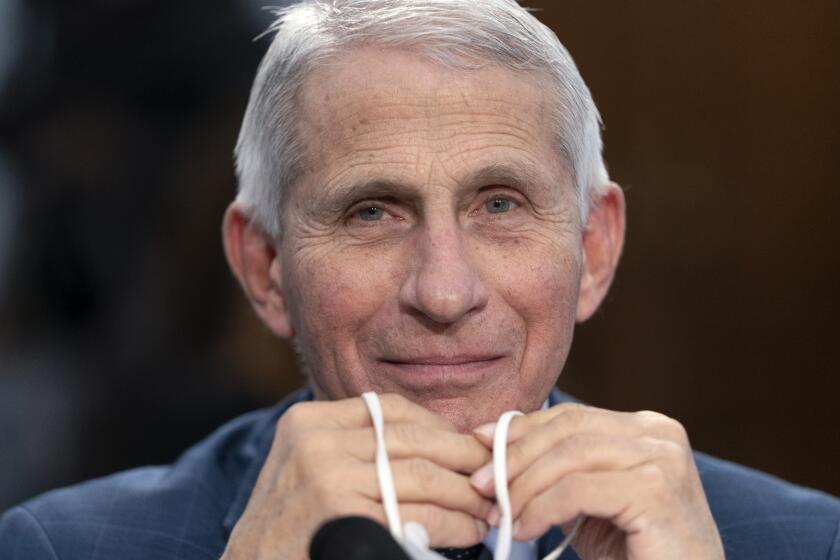Misfit by Conviction
George Orwell particularly liked Hans Christian Andersen’s tale “The Emperor’s New Clothes,” but he remarked that Andersen did not have much psychological acumen: in real life, when a child has the cheek to say that the emperor is naked, he is instantly silenced with a good spanking.
Orwell spoke from personal experience: the brave honesty with which he had exposed the Stalinist betrayal of the Spanish republican cause earned him the rabid enmity of the leftist intelligentsia, which ensured that his firsthand testimony, the magnificent “Homage to Catalonia,” was first slandered, then strangled by a strict and tight conspiracy of silence--and then buried off (the original 1938 edition, a modest printing of 1,500 copies, was still half-unsold 13 years later).
Meanwhile, his “Animal Farm” had fallen foul of government censors who attempted to prevent its publication (“Animal Farm” eventually appeared in 1945 after 18 months of rejections and setbacks). Indeed, immediately after the war, political opportunism even led U.S. occupation authorities in Germany to seize and destroy the Ukrainian edition of the book. (It might have offended the Soviet ally!)
And finally--supreme indignity!--the very people against whom Orwell had battled during his journalistic career endeavored to appropriate “Nineteen Eighty-four” as ammunition for their own crusade; the stupidity of the progressive camp, which had failed to see that Orwell was in fact their greatest writer, enabled the reactionaries to press-gang his dead body under their own banner. It is because they had read him that the left thought they should hate Orwell; whereas by not reading Orwell, the right could convince themselves they loved him. The principal merit of Christopher Hitchens’ useful--though uneven and sometimes hasty--collection of articles resides in its documented examination of the paradoxes presented by Orwell’s posthumous fate.
In politics, the old divide between a brainless left and a heartless right was well captured by Emerson: “There is always a certain meanness in the arguments of the Conservatives combined with a certain superiority in their facts.” Orwell’s unique strength--and also his curse--derived from the fact that, even though his commitment to socialism remained unwavering, at the same time (and to the great distress of his comrades) he constantly maintained a certain superiority of the facts. He never allowed political dogma to encroach upon his sense of reality; this requires uncommon moral discipline, but in the end, he could truly say: “Where I feel that people like us understand the situation better than the so-called experts, it is not in any power to foretell specific events, but in the power to grasp what kind of world we are living in” (my emphasis). Naturally, such “power” was not likely to endear him to ideologues on his side of politics; as Hitchens shows, half a century later, they still have not forgiven him.
The driving force through Orwell’s adult life was his passion for justice. As a young man, he gave up his career in the Burmese Imperial Police out of disgust for all forms of bullying and oppression. This experience marked his political awakening: “I wanted to submerge myself, to get right down among the oppressed, to be one of them and on their side against their tyrants.”
It also set the pattern for his later political attitudes: though his rejection of imperialism and colonialism remained final and uncompromising, he was not blind to the complexity of their human and cultural dimensions. Witness, for instance, the rich ambivalence of his appraisal of Rudyard Kipling: “I worshipped Kipling at thirteen, loathed him at seventeen, enjoyed him at twenty, despised him at twenty-five, and now [in 1936, at the time of Kipling’s death] again rather admire him”--and he admired him for his “personal decency” and for his “sense of responsibility.”
When fighting against fascism, he retained this awareness of human ambiguity that cannot be reduced to ideological cliches. Jack London fascinated him (“Iron Heel,” which Orwell first read when he was 15, left a deep impression on his mind and, 30 years later, was to become a seminal influence upon the conception of “Nineteen Eighty-four”), but he also detected in London a strong fascistic streak.
Early in the war (1941), in a review of H.G. Wells, an author he considered “too sane to understand the modern world,” he invoked again, in contrast, the prescient intuition of “Iron Heel” (“a crude book” that is also “a truer prophecy of the future”) and, as a corrective to Wells’ myopic sanity, he again referred to Kipling, who was “only half-civilized” but, “not being deaf to the evil voices of power and military ‘glory,’ would have understood the appeal of Hitler, or for that matter, of Stalin.” Orwell was not blind to the flaws of figures such as London and Kipling, but he also saw that these very flaws afforded them “the power to grasp what kind of world we are living in.”
Human reality always transcends ideology. This perception is the key to Orwell’s integrity and originality, and it never left him, even in the heat of battle, as was well-illustrated in a memorable vignette from the Spanish front. One morning, as he went “to snipe at the Fascists in the trenches outside Huesca... a man jumped out of the trench and ran along the top of the parapet, in full view. He was half-dressed and was holding up his trousers with both hands as he ran. I refrained from shooting at him ... partly because of that detail about his trousers. I had come to shoot at ‘Fascists,’ but a man who is holding his trousers isn’t a ‘Fascist,’ he is visibly a fellow creature, similar to yourself, and you don’t feel like shooting him.”
The pages Hitchens devotes to “Orwell and the Left” represent, I think, the most important chapter in his book. His inquiry into the poisonous hatreds that the memory of Orwell continues to arouse among the bien-pensants led him to unearth some very odd writings by (among others) Salman Rushdie and Edward Said. A century ago, Charles Peguy wondered what cowardly actions intellectuals would not be ready to commit out of fear of appearing insufficiently left-leaning. This observation is even more relevant today, and in its light, I guess Hitchens ought to be congratulated for his courage.
Of course, he dealt rather gently with “dear Salman,” but the fact remains: he dared to quote him and Said at great length--and one could not conceive of crueler treatment: Rushdie and Said stand in front of us, pilloried by their own prose. There is no space here to reproduce Hitchens’ lethal selection: readers should refer directly to his book. Suffice it to say, Rushdie criticized Orwell for his “quietism”; he found him guilty of following “an intrinsically conservative option,” advocating “a passivity which serves the interests of the status quo, of the people already at the top of the heap”; and he accused “Nineteen Eighty-four” of promoting “ideas that can only be of service to our masters.”
As everyone knows, Orwell risked his life for his ideas. He was grievously wounded by the fascists on the Spanish front and then narrowly escaped assassination by Stalinist thugs; he always lived off his pen, chained to the drudgery of freelance journalism in a state of permanent material insecurity. Yet Said’s criticism is even more outlandish than Rushdie’s. According to him, Orwell merely “observed” politics from the safe and cozy distance of a life spent in bourgeois comfort! And this reproach comes from a tenured American professor: Mt. Everest might as well begrudge a molehill its impudent height.
Whether it is justified, the credit enjoyed by Rushdie and Said is real enough; in compiling this amazing betisier, Hitchens accomplished a much-needed and salubrious task. His debunking of Claude Simon and of “post-modernist” critics, however, seems a waste of time and energy. As the Chinese proverb--invented by Jacques Maritain--says: “Never take stupidity too much in earnest.” (With the exception of three American scholars and seven Swedish academicians, who ever read Simon? In 1985, shortly before Simon received the Nobel Prize for literature, the French government, in a dastardly episode, sent its goons to sink the Rainbow Warrior in the port of Auckland. At the time, commenting on Simon’s award, a perceptive French literary critic wrote a piece that should remain the final word on the subject: He expressed the suspicion that, in retaliation, New Zealand had formed an axis with Sweden and just attempted to sink the French novel.)
Hitchens’ chapter on “Orwell and America” reminds me of Samuel Johnson, who once boasted that he could memorize one entire chapter from “The Natural History of Iceland,” titled “Concerning Snakes.” It went more or less like this: “There are no snakes in Iceland.” Orwell showed little interest in the U.S. and never visited the place. After the war, as England was severely rationed, he tried to obtain from America “a pair of shoes suitable for a large-footed man.” Whether or not this modest wish was granted is not known: It would have constituted one of his more significant transatlantic contacts.
On the subject of “Orwell and Englishness,” Hitchens contributes little that is new. At first, a parallelism with Philip Larkin seemed a promising theme, but Hitchens backs away from it on what seems irrelevant political grounds: “The whole repertoire of supposed Englishness and sentiments is a poor guide for questions of principle.” Yet, precisely, Englishness is not a question of principle and it has nothing to do with politics. The issue is visceral; it is perhaps the only topic on which Orwell ever comes close to waxing lyrical--or to displaying irrational feelings (such as his dislike of all things Scottish or his effusive celebrations of English cooking. Though he was not incapable of appreciating Continental cuisine, that he should still praise kippers and puddings seems to be pushing Englishness to the level of a willful perversity.) I wish I had space to quote in full the pages of poetic and emotional intensity in which he sang his love of England:
“When you come back to England from any foreign country, you have immediately the sensation of breathing a different air.... The beer is bitterer, the coins are heavier, the grass is greener .... The crowds in the big towns with their mild knobby faces, their bad teeth and gentle manners are different from a European crowd. [Note that, for Orwell, England is not in Europe.] Then the vastness of England swallows you up.... And the diversity of it, the chaos! The clatter of clogs in the Lancashire mill-towns, the to-and-fro of the lorries on the Great North Road, the queues outside the Labour Exchanges, the rattle of pintables in the Soho pubs, the old maids biking to Holy Communion through the mists of the autumn morning ... , yes, there is something distinctive and recognizable in English civilization.... It is somehow bound up with solid breakfasts and gloomy Sundays, smoky towns and winding roads, green fields and red pillar-boxes. It has a flavour of its own. Moreover it is continuous, it stretches into the future and the past, there is something in it that persists, as in a living creature.... And above all it is your civilization, it is you. However much you hate it or laugh at it, you will never be happy away from it for any length of time. The suet puddings and the red pillar-boxes have entered your soul. Good or evil, it is yours, you belong to it, and this side of the grave you will never get away from the marks it has given you.”
But perhaps if Hitchens fails to appreciate the depth and significance of Orwell’s Englishness, it is because he himself is an Englishman. Fish are not in the best position to comment upon the wetness of water. (By the way--this is an irrelevant aside--when Hitchens mentions Jonathan Swift’s Houyhnhnms, why does he characterize them as “cynical and evil”? Then, would he also qualify Yahoos as sweet and peace-loving creatures? I am puzzled. Perhaps there is here some second-degree irony that, in my lack of sophistication, I remain incapable to “deconstruct.”)
“The List” is one of Hitchens’ shortest chapters but, for it alone, it would be worthwhile to buy his book. In a few incisive and well-documented pages, Hitchens sets the record straight on an ignoble episode which is still in all memories. In 1996, some indecrottables Stalinists launched a rumor that quickly spread under various versions and took root in international opinion. The object of the operation was to slander Orwell’s memory and destroy his moral credibility by creating the impression that sensational new evidence had surfaced revealing that Orwell, far from being a man of towering integrity, was a stool-pigeon who, at the beginning of the Cold War, supplied blacklists of Communists and fellow-travelers to the British Secret Service.
The impact of these “revelations” was stunning: As the Daily Telegraph put it, “it was as if Winston Smith had willingly cooperated with the Thought Police in ‘Nineteen Eighty-four.’ ” The calumny was too enormous; yet, for a while it succeeded because of its very enormity. “Keep lying, always keep lying,” Voltaire advised, “in the end something will stick.” Actually the “new evidence” was not new. The “facts” had already been evoked--without provoking scandal, for there was no cause for scandal--in Bernard Crick’s authoritative biography, published in 1990. There was no “blacklist,” since no one’s employment was ever at stake. The private information that Orwell communicated to an old friend (employed in foreign affairs) at her own request was as unimpeachable as any conscientious and honest referee report.
If Orwell’s sober and accurate assessment of a series of fellow intellectuals and writers can be deemed dishonorable, then, by the same token, any scholar who, in the normal course of his duties, comments honestly on the competence and suitability of potential appointees to academic positions in his own discipline should be considered guilty of much greater crimes.
The fact that nearly half a century after his death Orwell should again be the target of such vile attacks is a good measure of the formidable menace which, beyond the grave, he still presents for his cowardly enemies. Yet, as regards this particular maneuver, I think that Hitchens has put paid to it once and for all.
As Hitchens shows, the permanent relevance of Orwell rests on the fact that he clear-sightedly identified the issues that mattered and on each of them expressed independent, strong and sound views. Furthermore, what added weight to his ideas was his admirable capacity to vouch for them with his own life and actions.
This being said, the last page of Hitchens’ book leaves me dumbfounded. He concludes by referring to W.H. Auden’s famous verses “In Memory of W.B. Yeats”--”Time that with this strange excuse / Pardoned Kipling and his views, / And will pardon Paul Claudel / Pardons him for writing well”--lines that can be aptly applied to supreme artists who were also wretched individuals but inappropriate twice over when speaking of Orwell. For which sins indeed should Orwell be forgiven? And where does his art ever reach the sort of sublimity for which, as Auden suggests, the great sinners of literary history should be pardoned?
In order to express his ideas, Orwell developed a writing style that is supple, lucid and arresting, achieving the very perfection of journalistic readability. Yet, if we read him today, it is not for the aesthetic enjoyment of his style but for the tonic quality of his ideas.
The jarring note of Hitchens’ disconcerting conclusion is all the more surprising because he obviously knows and loves his subject. The American edition of his book carries a title which, in its straightforward simplicity, is in harmony with Orwell’s spirit. The original English edition, on the contrary, was awkwardly entitled “Orwell’s Victory.” In fact, the name Orwell and the word “victory” were once before joined in a title, but it was to convey precisely the opposite meaning. I refer to the moving memoir of Richard Rees, “George Orwell, Fugitive From the Camp of Victory.” Rees, who was one of Orwell’s few intimate friends, borrowed his superb title from Simone Weil: “... If we know in what way society is unbalanced, we must do what we can to add weight to the lighter scale and be ever ready to change sides like justice, ‘that fugitive from the camp of victory.’ ”
For Orwell, “misfit by conviction” (in the felicitous expression of John Carey), victory--like success and power and authority--was suspect by nature; he endorsed Arthur Koestler’s view that “all revolutions are failures.” He believed that “men are only decent when they are powerless”; he confessed “failure seemed to me the only virtue--every suspicion of self-advancement, even to ‘succeed’ in life to the extent of making a few hundreds a year seemed to me spiritually ugly, a species of bullying,” and again, “I never went into a jail without feeling that my place was on the other side of the bars.”
By any stretch of the imagination, I cannot picture what a triumphant Orwell should look like. Had he lived, could fame--and wealth--ever have altered him? One may doubt it. Shortly before his death, when it became obvious that “Nineteen Eighty-four” would become a major bestseller (a new experience for Orwell), he indulged for once in a luxury purchase; he never had the chance to make use of it, but it still provides us a valuable clue on how success might have affected his life: he bought a good fishing rod.
More to Read
Sign up for our Book Club newsletter
Get the latest news, events and more from the Los Angeles Times Book Club, and help us get L.A. reading and talking.
You may occasionally receive promotional content from the Los Angeles Times.






